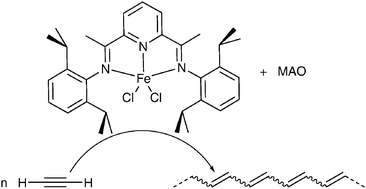A team of chemists working in the UK and Australia have developed a new, highly active catalyst for acetylene polymerisation.
Polyacetylene is an important material as it has a degree of conjugation that leads to good conductive properties. It has found uses in areas such as synthetic metals and plastic electronics. New routes to make this polymer are constantly sought and, to date, the majority of catalysts for this task have low activities.
This problem has now been solved by two teams at the University of Tasmania and Imperial College London led by David McGuinness and George Britovsek, respectively. They took a bis(imino)pyridine iron catalyst, normally used for ethylene polymerisation, along with methylaluminoxane and successfully produced polyacetylene.
An activity of 62 500 h-1 (turn over frequency; TOF) was obtained, which compares excellently with the 100 h-1 TOF obtained when using a standard existing acetylene polymerisation catalyst under the same conditions. This represents the most active acetylene polymerisation reported to date. Curently, the team are studying the effects of ligand modification and chain transfer reagents on the reaction.
Want to find out more? Then download the full ChemComm article for free today.











